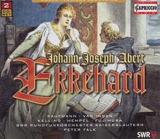|
|
|
|
|
|
|
| OPERA NEWS |
| JOHN W. FREEMAN |
|
|
ABERT: Ekkehard
|
| Van Ingen, Kelling, Fujimura; Kaufmann,
Reiter, Gerhaher, Hempel, Böhm; Stuttgart Choristers, South German Radio
Orchestra, Falk. German libretto only. Capriccio 60-080 (2) |
|
|
 Among
composers of late-Romantic German opera, such names as Engelbert
Humperdinck, Hermann Goetz and Siegfried Wagner occasionally come up, but
you won't hear much about Johann Joseph Abert (1832-1915). Born in Bohemia,
he worked for decades in Stuttgart, but the distinguishing feature of his
operas is their absorption of French influence, thanks to a prolonged period
of study in Paris. Capriccio's CD revival of Ekkehard (1878) stems from a
concert performance aired over South German Radio in 1998 during the Autumn
Music Days at Bad Urach. Those who can read German will be ahead of the
game, as only the original libretto is supplied, and the English plot
outline leaves out a lot. Perseverance is advised, however: this opera is
worth hearing. Among
composers of late-Romantic German opera, such names as Engelbert
Humperdinck, Hermann Goetz and Siegfried Wagner occasionally come up, but
you won't hear much about Johann Joseph Abert (1832-1915). Born in Bohemia,
he worked for decades in Stuttgart, but the distinguishing feature of his
operas is their absorption of French influence, thanks to a prolonged period
of study in Paris. Capriccio's CD revival of Ekkehard (1878) stems from a
concert performance aired over South German Radio in 1998 during the Autumn
Music Days at Bad Urach. Those who can read German will be ahead of the
game, as only the original libretto is supplied, and the English plot
outline leaves out a lot. Perseverance is advised, however: this opera is
worth hearing.
The story combines warlike monks and an Ortud type of pagan sorceress with a
too-good-to-be-true duchess and her chivalric love affair with Ekkehard, a
monastic tutor knight (how else to describe him?). Thanks to Abert's genuine
gifts as a melodist, the score is more appealing than its subject. In his
efforts to emulate Wagner without sounding too modern, Abert wrote page
after page of lovely, natural-sounding dialogue to his own stilted, rhymed
text. The climactic love duet of Act III, divided in parts like the duet
from Un Ballo in Maschera, is a cornucopia of distinctive, generous melody,
and the finale that follows is effectively structured. Abert's writing
combines an admirable sweet simplicity with subtle touches of harmony and
orchestration. Bassoons growl and flutes flicker while the villainous
Montfort schemes Ekkehard's downfall.
There's no weak link in the cast, though some characterizations are less
than vivid. As Hadwig, Duchess of Swabia, Nyla van Ingen could use more heft
and authority. She and her handmaiden, Praxedis (Susanne Kelling), both err
on the side of caution. The same goes for Mihoko Fujimura as the Woman of
the Woods, the anti-Christian witch who wages war against the brotherhood of
monks; there's more to her role than meets the ear in this performance. On
the other hand, everyone sings pretty much on pitch, and the sense of
singing style is everywhere right for the music.
The strength of the cast, happily, lies in its protagonist, Jonas Kaufmann,
whose pure, unwavering lyric tenor holds a firm legato and gives the role
heartfelt convinction, notably in his Act III monologue, "Der Gedanken Sturm
zu bannen." Jörg Hempel doesn't put quite enough teeth into the role of
Montfort; his baritone sounds watery. The other players -- Christian
Gerhaher as the jolly cellar master, Alfred Reiter as the Abbot, Henryk Böhm
as the Duchess's treasurer -- put spirit into their work, as does the
chorus, whose music includes both folklike tunes and more complex ensembles.
The idiomatic conductor, Peter Falk, persuasively unifies and enlivens this
reading, and the studio sound is fine.
|
|
|
|
|
|
|
|
|
|
|
|
|
|
|